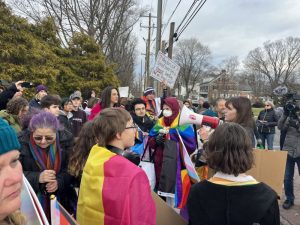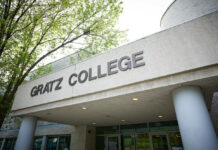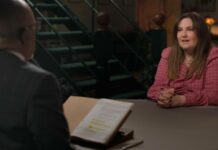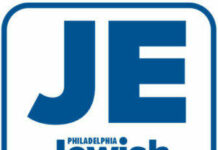
A recent instance of Holocaust censorship at a Central Bucks high school has sparked concern and anger in the Greater Philadelphia Jewish community.
On Jan. 25, the principal of Central Bucks High School South ordered a school library to take down a poster displaying a quote from Holocaust survivor and Nobel Peace Prize winner Elie Wiesel.
The quote, part of Wiesel’s 1986 Nobel Peace Prize acceptance speech, read, “I swore never to be silent whenever and wherever human beings endure suffering and humiliation. We must always take sides. Neutrality helps the oppressor, never the victim. Silence encourages the tormentor, never the tormented.”
Though the Central Bucks School District allowed librarian Matt Pecic to put the poster back up the next day and issued an apology, parents in the district, including Jewish ones, expressed distress.
“I couldn’t believe that they actually took the poster down and felt that they were justified in doing so,” said Jerel Wohl, a Jewish parent with three children who graduated from Central Bucks High School South.
The initial decision to remove the poster was in tandem with the Central Buck School Board’s passage of policy 321 in January, first introduced in September, which bans teachers from promoting “advocacy activities” displaying symbols of “any partisan, political, or social policy issue.”
According to parents, the school board created the policy specifically to target LGBT pride symbols, such as the rainbow flag.
The policy has attracted attention beyond parents and students in the district: The ACLU issued a complaint against the policy, saying it would create a “hostile” environment for LGBT students; the Department of Education has launched an investigation of the school district and its compliance with Title IX, which prevents discrimination based on gender or sexual orientation.
Jewish parents and leaders see the censorship of the Wiesel quote as an immediate consequence of policy 321.
“Very clearly, it’s manifesting in some dark ways immediately,” said Jewish parent Lela Casey, who has three children, two of whom attend school in Central Bucks.
“This type of censorship is what we feared would be the consequence of that overbroad and harmful policy,” added Andrew Goretsky, regional director of ADL Philadelphia.
Though proponents of policy 321 argue that schools and teachers maintaining neutrality would prevent students from being taught political biases, Goretsky expressed concern that the policy would have a “chilling effect on student learning and growth.” He said that LGBT students and students from other marginalized groups would feel alienated in the classroom, an environment that would hinder learning.
“Students deserve schools where they can be who they are and where their identities are celebrated, their backgrounds are celebrated,” he said.
Parents opposed to the policy have identified LGBT students as the policy’s main target, but argue that protesting the policy is still a Jewish issue.
“We can be a little remiss in forgetting how connected these things are,” Casey said. “When they’re coming after Black communities, when they’re coming after LGBT communities, we’re next. It’s all connected.”
Instances of censorship in the classroom have set off alarm bells for Holocaust educators, who have observed an increase in banned books and censored curricula. Last January, the McMinn County, Tennessee, school board voted unanimously to ban Art Spiegelman’s “Maus” from its curriculum for the graphic novel’s use of nudity and profanity. That same month, a Republican Indiana state senator argued in an education bill that teachers should be “impartial” in their lessons about the Holocaust and Nazi Germany, JTA.org reported. The senator later apologized.
“The Holocaust is not about elevating one religion or another. It’s a historical incident,” said Katie Lowe, program and collections director at the Elkins Park-based Holocaust Awareness Museum and Education Center.
Though only in her role for less than a year, Lowe has noticed similar rhetoric as policy 321 being used to argue against thorough Holocaust education.
“More schools than I expected had a lot of hoops that they had to jump through in order to approve Holocaust programming,” she said. “And it was really clear, based on the conversations we were having by the representatives from those schools, that the concern was coming from parents who were worried about the schools taking non-neutral stances, or appearing to promote one religion over another.”
Like concerned parents, Lowe believes that the argument for eliminating politics or “advocacy activities” in the classroom is not helpful in combating hate.
“What’s especially concerning is the implication that teaching the Holocaust is a political act. Because it’s not political to teach historical facts,” she said. “And it’s not political to encourage and foster empathy in our students.”
Lowe recommended that individuals interested in combating Holocaust censorship take time to educate themselves. HAMEC Education Director Leah Dukes suggested visiting museums and libraries to learn more, or arranging for a Holocaust survivor to visit a school through HAMEC.
In the meantime, Jewish parents and students in Central Bucks, according to Casey, will continue to protest and attend school board meetings, as well as vote in the November elections to oust right-wing school board members.
“Our primary focus has to be to change the school board so that we don’t keep having policies like 321, and we don’t keep having a culture that’s so harmful to our kids,” Casey said.






